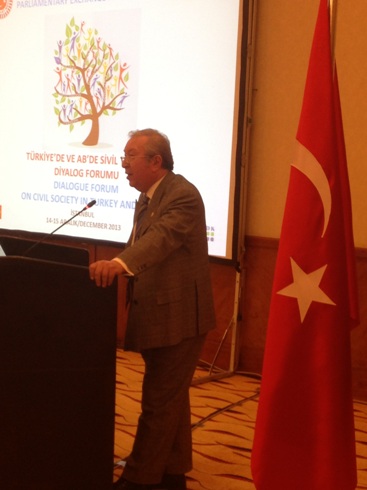Dr. Akkan Suver has made a speech at the Parliamentary Exchange and Dialogue Program
President of Marmara Group Foundation Dr. Akkan Suver has made a speech themed globalization and civil society at the EU and Dialogue Forum of the Parliamentary Exchange and Dialogue Program organized in Istanbul. Dr. Akkan Suver has stated the Marmara Group Foundation's views at the session of Civil Society and Globalization moderated by Member of Parliament Afif Demirkıran. Italian academic Ass. Prof. Raffaele Marchetti, British Lord Richard Balfe and TESEV's Director Fikret Toksöz have also delivered their opinions in the session.
(1).jpg)
The text of Dr. Akkan Suver's speech is as below;
"Ladies and Gentlemen,
Globalization in a broader sense, is the inevitable outcome of our era.
In my speech, I will talk about globalization, civil society, democracy and their relevance with governance.
Accordingly, I see civil thought as a new kind of power that strives to produce common solutions to common problems and in relevance to that effort organizes campaigns, creates public opinion pressure on the decision making bodies.
Therefore, civil society organization or the NGOs are one of the new geopolitical actors of globalization.
Especially, the civil initiatives that are important parts of the international relations system and the today's geopolitical structure are being characterized as one of the new supremes of the world by some experts.
This evaluation might be a little exaggeration but the fact that civil society organizations are amongst the important geopolitical actors in today's world is beyond doubt.
With a broader assessment, participation constitutes the main principle of globalization and democracy which are the intellectual areas of the social transformation.
The fact that global thinking creates an intellectual sphere within the values civil society is another beyond the doubt concept. Therefore, the existence of civil society, combined with globalization has now become one of the tools of sustainable democracy and economic development and hence the progress.
Long before the appearance and acceptance of globalization, on February 27, 1950 in its resolution 288-B, United Nations Economic and Social Council states that civil society organizations can attend UN operations as ''organizations external to the intra-governmental agreements''.
With the appearance of globalization, civil initiatives in today's world, bypassing all ethnic and national borders, became effective in almost any area of the structure of the international system such as economic, social, political, cultural and communicative.
The globalization's perception of civil society organization within the framework of contemporary geopolitics varies.
Civil society organizations can be evaluated in two groups depending on their effectiveness power.
- Civil society organizations effective in a given country,
- Civil society organizations effective in the international arena and have the power to influence many countries domestic issues as well as international matters.
The civil society organizations that are effective in the international arena are generally related to issues such as humanitarian situations, human rights, environment and economic integration.
For example, Doctors Without Borders, Journalists Without Borders, Amnesty International, Freedom House, International Transparency Organization, Greenpeace and Femen are organizations that fitting to this category.
Civil society organizations as the one of the new actors of globalization are now indispensable elements of the international arena.
In other words, globalization can be understand as the increasing bonds between the civil society organizations. The increased connection of people in the globe will cause technological, cultural, intellectual and communicative bonds to be increased as well.
In a globalized world the incidents and processes that are threatening the humanity should be dealt within the universal dimensions of civil thought based on scientific foundation and with a serious global approach rather than broad geopolitical framework.
Only this sort of approach can ensure that civil society organizations reach to more efficient, more responsible structure.
Now the globalization is being transformed into the new realm of the social life.
For example before governance meant the state alone. State still makes the rules, but in a more globalized world the meaning of governance is no longer imply solely the state alone.
Participation and the opinions of the civil society started to influence the state decision making mechanisms. And states started to show tendencies of change. Now many states are paying attention to what global civil society organization have to say. They are being forced to take the suggestions of IMF, European Court of Human Rights and United Nations into consideration.
With this plural centered governance and the human rights demands, the votes of their sympathizers are not being enough for governments to stay in power.
Governance in globalization is democratic as long as governments share their decision making authority with their people. Civil society is democratic to a degree that it is effected from this regulations and as long as it can decide about those regulations.
In a country where globalization is experienced, if there is a democracy than the decisions are being made in consultation with the civil society organizations. Democratic governance is an indication of extended role of the civil society just as it is an indication for globalization.
Democratic governance which is one of the outcomes of globalization means openness, transparency and accountability. Therefore it means civil society organizations to bring the decision makers to account.
The realization of all these can only be possible if the citizens can be aware of the surrounding they live within and become individuals.
How can they can participate to the governance if they are not?
The fact that we know is, as a society we do not know a lot about globalization and governance. It is not being taught at universities, let alone schools. Media and the institutions tied to the administration do not enlighten us sufficiently either.
That is our primary problem! An individual that can not be globalized with his citizen ignorance!
If we, the civil society organizations want a more democratic globalization, we must qualitatively and quantitatively strengthen our institutions, but first we must learn and educate ourselves."


